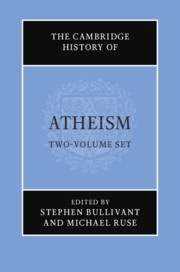Book contents
- The Cambridge History of Atheism
- The Cambridge History of Atheism
- Copyright page
- Dedication
- Contents
- Acknowledgments
- Contributors
- Introduction
- Part I Preliminaries
- Part II Atheisms in History
- Part III Reformation, Renaissance, Enlightenment
- Part IV Classical Modernity: Philosophical and Scientific Currents
- Part V Classical Modernity: Social and Political Currents
- Part VI Twentieth and Twenty-First Centuries: Intellectual and Artistic Currents
- Part VII Lived Atheism in the Twentieth- and Twenty-First Centuries: Case-Studies
- 42 Latin America
- 43 The Road to Modern China
- 44 Contemporary China
- 45 Atheism in India: Twentieth Century and Beyond
- 46 The Soviet Union
- 47 Modern Germany
- 48 The Nordic and Baltic Countries
- 49 United States
- 50 The Pacific Northwest
- 51 Tunisia
- 52 Southern Africa
- 53 Traditional Societies
- Part VIII Emerging Atheisms in the Twenty-First Century
- Part IX Conclusion
- Index
- References
43 - The Road to Modern China
from Part VII - Lived Atheism in the Twentieth- and Twenty-First Centuries: Case-Studies
Published online by Cambridge University Press: 25 September 2021
- The Cambridge History of Atheism
- The Cambridge History of Atheism
- Copyright page
- Dedication
- Contents
- Acknowledgments
- Contributors
- Introduction
- Part I Preliminaries
- Part II Atheisms in History
- Part III Reformation, Renaissance, Enlightenment
- Part IV Classical Modernity: Philosophical and Scientific Currents
- Part V Classical Modernity: Social and Political Currents
- Part VI Twentieth and Twenty-First Centuries: Intellectual and Artistic Currents
- Part VII Lived Atheism in the Twentieth- and Twenty-First Centuries: Case-Studies
- 42 Latin America
- 43 The Road to Modern China
- 44 Contemporary China
- 45 Atheism in India: Twentieth Century and Beyond
- 46 The Soviet Union
- 47 Modern Germany
- 48 The Nordic and Baltic Countries
- 49 United States
- 50 The Pacific Northwest
- 51 Tunisia
- 52 Southern Africa
- 53 Traditional Societies
- Part VIII Emerging Atheisms in the Twenty-First Century
- Part IX Conclusion
- Index
- References
Summary
The term atheism infers one of three basic definitions. Someone who considers him or herself an atheist may simply lack a belief in the existence of supernatural, divine forces. Some, more narrowly, may outright reject such a belief, and still others, in the strictest sense, take the position that there really is no debate to be had.
At a glance, directly associating Chinese tradition with even the more open-ended definition of atheism (a mere lack of belief) would seem rather forced. While it is true that certain religious beliefs were suppressed by those higher up the ladder throughout Chinese history and that some of China’s brightest and most intellectual voiced vehement suspicion, disregard, and even stark criticism, these actions still fell very far short of what it means to be atheist. The same could also be said for commoners, who took a more pragmatic (as opposed to a theist/atheist) approach when it came to religious observance and practice.
- Type
- Chapter
- Information
- The Cambridge History of Atheism , pp. 786 - 808Publisher: Cambridge University PressPrint publication year: 2021



